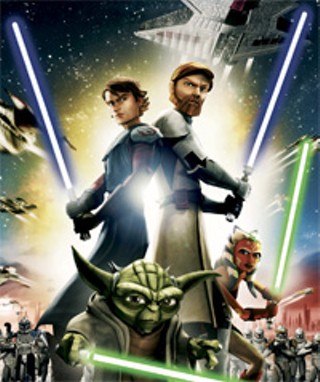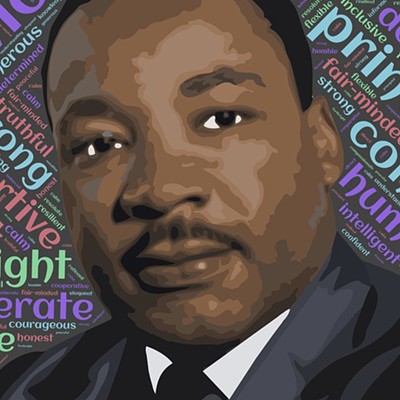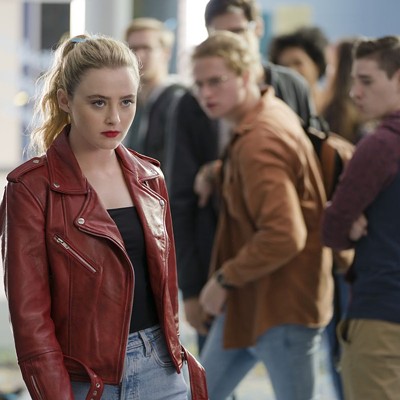Pop quiz, hotshot. Which line of dialogue does not appear in a Star Wars movie?
A) “May the Force be with you.”
B) “Join me, and together we can rule the galaxy as father and son.”
C) “So this is how liberty dies, with thunderous applause.”
D) “Does sweet’um want some num-nums?”
I wish I could say that the correct answer is D), but actually all four lines appear in one installment or another, with that atrocious final snippet of dialogue appearing in the new animated feature Star Wars: The Clone Wars. The early word is that only Star Wars fanatics will enjoy this latest addition to the franchise, but that’s grossly inaccurate: As someone who was 11 years old when the original film hit theaters back in the summer of 1977 and thus has always considered it a rites-of-passage milestone, I was nauseated upon stumbling out of George Lucas’ latest sorry attempt to squeeze every last penny out of this franchise. Set in the period between Episodes II (Attack of the Clones) and III (Revenge of the Sith), this focuses on the war that helped the evil Empire take over the galaxy. The principal story strand concerns the efforts of Anakin Skywalker and his teenage apprentice (Lucasfilm, meet the Disney Channel) to rescue Jabba the Hutt’s kidnapped baby boy from Count Dooku and his posse. What sort of nonsense is this? Jabba also has a swishy relative (Ziro the Hutt) who speaks exactly like Truman Capote(!). And while Jar Jar Binks is thankfully nowhere to be found, the battle droids prove to be every bit as idiotic and insufferable — and there are lots of them in the movie.
The CGI animation is harsh on the eyes and proves to be aesthetically unpleasing. A couple of action sequences do manage to elevate this film out of the realm of utter despair, but for the most part, this is curdled cinema that even the fans will upchuck.
VICKY CRISTINA BARCELONA
A menage a trois between the luscious, Olympic-worthy team of Scarlett Johansson, Javier Bardem and Penelope Cruz is one of the various expressions of intimacy found in Vicky Cristina Barcelona, but viewers shouldn’t attend the movie expecting to see explicitness on the order of, say, Shortbus or Henry & June. After all, the film’s writer-director is Woody Allen, and he’s always been much more interested in exposing the intricacies of the heart than the pleasures of the flesh. Yet therein lies the major problem with the picture: Allen has basically told a tale that depends on carnal knowledge as much as anything else, and the soft-pedaling of the harsher aspects of the story make Vicky Cristina Barcelona feel, well, as if it were made by a 72-year-old filmmaker who’s tentatively stepped outside his comfort zone. The end result is an interesting misfire, and one whose overlapping themes might resonate more strongly on a second viewing.
Rebecca Hall and Johansson, the female co-leads in The Prestige, here play pragmatic Vicky and impulsive Cristina, two Americans vacationing in the lovely Spanish city when they’re propositioned by the seductive, sensual artist Juan Antonio (Bardem) to join him for a weekend of food, wine and sex. Eventually, both women do succumb to his charms (albeit at different points), only to find matters growing more complicated once his fiery ex-wife Maria Elena (Cruz, stealing the show) re-enters his life.
Allen can hardly be accused of phoning in this script: The movie stumbles over itself while bringing fresh life to a number of issues, among them our need for familial security (at whatever cost) versus our desire for hedonistic experimentation; the ability of one’s artistic impulses to be awakened by a foreign culture (this speaks as much about Allen as it does budding photographer Cristina, with Allen filming exclusively overseas since leaving Manhattan for England for 2005’s Match Point); the dangers inherent in an unchecked creative lifestyle; and the viewpoint that sex in itself need not be a shallow vice but rather a passageway into deeper understanding between people. The notions presented on screen are worthy of discussion, but I just wish Allen had given them more of a chance to be heard. Instead, there’s a reticence about the film that stops even the most interesting scenarios short. The hoary show biz axiom may declare, “Always leave them wanting more,” but in this case, I wish Allen hadn’t kept us hanging.
HENRY POOLE IS HERE
Faith-based movies aren’t exactly overflowing at the multiplexes, so it’s nice to see sincere religious overtones in a picture that flies in the face of typical mainstream fare which generally paints all Christians as close-minded, intolerant rubes. Of course, considering there are enough of these hypocritical dimwits populating the country to put the “born-again” Bush into office twice, you can’t really blame Hollywood for its own myopia, but still, the gesture behind Henry Poole Is Here is appreciated. Unfortunately, the movie doesn’t know when to quit, and what begins as a thoughtful examination of spirituality versus skepticism turns irrevocably heavy-handed by the end.
Luke Wilson plays Henry, a dying man (from what, we never learn) who moves into a shabby house in a California suburb with the intention of spending his last, lonely days there. But a nosy neighbor (Adriana Barraza) changes all that after she insists that the water stain on the backyard wall of Henry’s house is actually the face of Christ. Soon, unexplained “miracles” begin occurring to those who touch the wall, with local believers lining up to pay respect to the image. Henry, who doesn’t believe in much of anything, is angered by all this unwanted attention, though he does let down his guard enough to strike up a relationship with his lovely next-door neighbor (Radha Mitchell).
Henry Poole Is Here is initially interesting in its ambiguity, and it benefits from strong work by Mitchell and Rachel Seiferth as a grocery store clerk who senses Henry’s misery. But once the mystery surrounding the water mark dissipates, the film begins to bark at viewers like a tent-revival evangelist, and sober discussions give way to a clumsily handled finale that doesn’t stand a prayer of satisfying most discerning viewers.
The Sisterhood of the
Traveling Pants 2
The 2005 screen version of The Sisterhood of the Traveling Pants was based on the first novel in Ann Brashares’ best-selling series, but the word is that The Sisterhood of the Traveling Pants 2 combines the events from the remaining three books in the franchise.
One reason is probably because the studio felt that audience interest wouldn’t extend past a second installment. Another might be that the four stars of the first film have kept busy with other projects and may not particularly wish to keep returning to the same well. And the third reason is that who wants to eventually see 30something actresses still playing college-age kids? (It brings to mind the third and final film in the Porky’s series, wherein high school boys were suddenly having to contend with receding hairlines.) A solid follow-up to the solid original, Sisterhood 2 might feel a bit more scattershot than its predecessor, but its engaging characters, entertaining situations and emotional reach should help it find approval with those who grooved to the rhythms of the first picture. Set three years later, it finds the best-laid summer plans of the four friends — brainy Carmen (America Ferrera), introspective Bridget (Blake Lively), rebellious Tibby (Amber Tamblyn) and shy Lena (Alexis Bledel) — blown to smithereens as each ends up doing her own thing rather than hanging out as a group. Thus, Carmen heads to Vermont to work in theater (check out a funny Kyle MacLachlan as the pompous director), Bridget travels to Turkey for an archaeological dig before heading to her grandmother’s house in the South to solve some family mysteries, Tibby remains in New York to work on her film and worry about possibly being pregnant, and Lena, heartbroken after being dumped by her Greek lover, finds new romance at the Rhode Island School of Design. Problems are worked out in an orderly manner, tears are shed in sincere fashion, and everyone is eventually reunited in sunny Greece, with nary a single ABBA-mangling peasant in sight.
Tropic Thunder
The opening salvo of Tropic Thunder reps perhaps the funniest 10 minutes I’ve encountered in a movie theater this year. But the best news is that the movie manages to keep the laughs hurtling forward for its entire running time, no small feat in an era in which many comedies lose steam by the final reel. Ben Stiller, whose fingers are all over this picture (as star, director, co-writer and co-producer), does himself proud by successfully orchestrating the diverse elements that make up this ambitious picture, from a roster of A-list actors (some in supporting roles) to a decidedly non-PC screenplay that touches upon clashing acting methods, venal movie moguls, and the correct way in which to play a mentally challenged character (tip: don’t go “full retard” if you want a shot at the Oscar). Stiller stars as Tugg Speedman, a macho action star whose one attempt at an awards-bait title, the resounding flop Simple Jack, has largely derailed his career. Jack Black plays Jeff Portnoy, a comedian known for vulgar blockbusters. And Robert Downey, Jr. essays the role of Kirk Lazarus, a five-time Academy Award-winning actor celebrated for his Method approach to acting. All three, plus rap star Alpa Chino (Brandon T. Jackson) and screen newcomer Kevin Sandusky (Jay Baruchel), are in Vietnam shooting the war movie to end all war movies. But on-set mishaps and temperamental actors immediately put the film behind schedule, and the grizzled technical advisor (Nick Nolte) suggests to the director (Steve Coogan) that the pampered stars should be taken to a rough spot of the jungle where, away from the rest of the cast and crew, they’ll buckle up and get the movie made. Stiller is funnier here than he’s been in some time, and he’s especially blessed to have surrounded himself with such a knockout cast. Black has some riotous moments as a drug fiend struggling with his dependency, while Matthew McConaughey, freed from inane rom-coms opposite Kate Hudson, is appealing as Speedman’s lively agent. The cast even includes Tom Cruise, who’s clearly having fun as a bald, bad-tempered studio boss with no morals whatsoever (it’s like rewatching Cruise’s Magnolia character, only this time with a laugh track). Yet the acting honors easily go to Downey. His Kirk Lazarus is so dedicated to his craft that he undergoes surgery to have his skin darkened so he can play an African-African character in the Vietnam War opus. Being a Method actor means that he talks “black” even when the cameras aren’t rolling, an affectation that really annoys Chino, the cast’s authentic African-American. Downey is an absolute riot in this role, and between this and Iron Man, I’d say he’s having a helluva summer.
Pineapple Express
It’s been a roller coaster year for Judd Apatow, who as producer seems to have had a hand in practically every 2008 comedy not starring Mike Myers or Eddie Murphy. The lamentable Drillbit Taylor was quickly followed by the bright Forgetting Sarah Marshall, and now the mediocre Step Brothers has moved aside for the rollicking Pineapple Express.
Pineapple Express doesn’t benefit from the polished characterizations or heartfelt scenarios of Apatow’s big hits The 40-Year-Old Virgin and Knocked Up, but as far as crude, rambling, shaggy-dog comedies go, this one’s better than most of the modern-day crop. Here we have process server Dale Denton (Seth Rogen) and drug dealer Saul Silver (James Franco); they’re forced to take it on the lam after Dale witnesses a drug lord (Gary Cole) and a crooked cop (Rosie Perez) commit cold-blooded murder and the killers are able to trace the rare pot (“Pineapple Express”) that Dale leaves at the crime scene back to the eternally fried Saul. Pineapple Express boasts a pair of major surprises. The first is that instead of turning to a regular member of his troupe to direct the picture, Apatow chose David Gordon Green, known for micro-budgeted indie films (All the Real Girls, George Washington). The second is that Franco, generally the blandest of pretty boys, succeeds in his change-of-pace role as a long-haired stoner who has trouble understanding the words that anyone speaks to him (when Dale tells him he’s a process server, Saul replies, “You’re a servant? Like a butler? You shine shoes?”). Not surprising in the least is that Rogen again scores in his role as a disheveled slacker with a way with words.
The Mummy: Tomb of the Dragon Emperor
1999’s The Mummy was a barely passable Indiana Jones rip-off, while 2001’s The Mummy Returns proved to be rather dismal. This one, though, is the worst of the lot — and certainly the most boring. Somehow, I managed to stay awake during the grueling expository sequences. I’m not referring to the prologue showing how, in the China of 2,000 years ago, a sorceress (Michelle Yeoh) places a curse on an evil emperor (Jet Li) who can now only be awoken by a drop of human blood; I’m talking about the excruciating scenes in which retired adventurer Rick O’Connell (series star Brendan Fraser) and his wife Evelyn (Maria Bello, replacing Rachel Weisz after the latter declared, “Screw this; I have an Oscar now!”) mope around their English estate in 1946 while grown son Alex (Luke Ford) is (unknown to them) off digging up the emperor. Plot contrivances reunite all of them in Shanghai, and from there, the gang is forced to fight the now-revived emperor. Is that really Maria Bello looking so glum up there on the screen, doubtless recalling how her formidable talents are more suited to the likes of A History of Violence and The Cooler than to treacle like this? And do scripters Alfred Gough and Miles Millar think that audiences will be impressed by dialogue that basically consists of variations on Rick yelping, “Well, here I am fighting mummies again!”?
Step Brothers
The battle for the title of Hollywood’s Ultimate Man-Child finds Will Ferrell finally overtaking Adam Sandler. The law of diminishing returns — to say nothing of Step Brothers’ cringe-inducing trailer — suggests that this should represent the nadir of Ferrell’s efforts, but the truth is that he’s done worse. For the most part, this is crap, yet it’s rescued from the bottom of the sewer by several choice quips as well as a surprising sweetness at the center of its storyline involving family dysfunction. Ferrell and Talladega Nights partner John C. Reilly star as Brennan and Dale, two 40-ish men still living at home with their single parents (Mary Steenburgen and Richard Jenkins, respectively). When said parents decide to marry each other, the two “kids” are forced to not only live under the same roof but also share a bedroom. They become best friends after they’re united by their mutual hatred of Brennan’s smug, perfectionist brother Derek (Adam Scott). As usual, Ferrell doesn’t know where to draw the line when it comes to childish antics on screen (the sleepwalking segments involving Brennan and Dale are especially exasperating), and the sight of Brennan dragging his exposed nutsack across Dale’s precious drum set serves as an example of the sophomoric levels to which this film will stoop. But the theme of how parents and children will often fail each other carries some startling resonance (thanks largely to Steenburgen’s delicate performance), and every time we write off the dialogue as just a string of schoolyard taunts, along comes an unexpected zinger. Step Brothers is clearly a step up from this past spring’s Ferrell offering, Semi-Pro, but please, guys, it’s time to grow up and give this formula a rest.
An assembly-line comedy in virtually every facet — you can set your watch by the moment when the formerly aloof Drillbit (Owen Wilson) is visibly moved by a charitable act on the part of one of the kids — this dispiriting attempt at corralling laughs has little to offer anyone except die-hard Owen Wilson fans.
, and even those devotees might feel dejected after watching this charming if one-note actor spinning his wheels in such a tiresome character type.


























